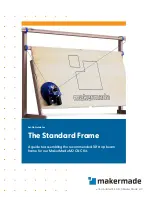
ENGLISH
en
6
Never use power tools when damp, or in a damp or
wet environment.
Take special care when using tools near
combustible materials. Never direct at the same
point for long periods.
Heat can be directed to concealed combustible
materials.
Never direct the heat gun at highly flammable
materials! Fires can be caused if the heat gun is not
used with great care.
Never leave the tool unattended when it is running.
After long periods of use at maximum temperature,
the temperature should be lowered before the tool is
switched off. This lengthens the service life of the
heater.
Place the tool on the bases provided following use
and wait until it has cooled down before placing in
storage!
Store your tools in a safe place.
Unused tools should be stored in a dry, locked room
inaccessible to children.
Always take care where there are toxic gases and a
risk of explosion.
Toxic can be created when working on plastics,
paints and similar materials. Risk of fire and
combustion!
Only use the heat gun in well-ventilated rooms!
Never inhale the vapours created!
For your own safety, only use accessories and
auxiliary devices specified in the Operating
Instructions or recommended or specified by the
tool manufacturer. The use tools or accessories
other than those recommended in the Operating
Instructions or in the catalogue can result in a risk of
injury.
Symbols on the tool:
......... Class II Construction
V............. volts
A............. amperes
W............ watts
Hz........... hertz
~ ............. alternating current
See page 2.
1 Stainless steel outlet tube
2 Detachable protective tube (for areas that are
difficult to access)
3 Air inlet with grid (keeps foreign bodies out)
4 Sliding switch (On-Off switch/stepping switch)
5 Anti-slip bases (for non-tilting and anti-slip
stationary work applications)
6 Buttons for setting the temperature*
7 Buttons for setting the air volume*
8 Program selection button*
9 Display* (for temperature and speed)
10 Save button* (for saving changed programs)
11 Adjusting wheel for setting the temperature*
* depending on the features / model
Before plugging in, check that the rated mains
voltage and mains frequency, as stated on the
rating label, match with your power supply.
The distance to the object being processed
depends on the material and intended
processing type. Always first carry out an inspection
of air volume and temperature! The attachable
nozzles (see chapter 8.) available as accessories
can be used for precise hot air control to a specific
point or a surface.
Take care when changing hot nozzles! Danger
of burns.
5.1 H 16-500
The sliding switch (4) can be used to switch the tool
on and off and for selecting between 2 stages (for
air volume and temperature).
Stage 1
: 750 °F, 8.5 cf/min
Stage 2
: 1100 °F, 14.8 cf/min
5.2 HE 20-600
The sliding switch (4) can be used to switch the tool
on and off and for selecting between 3 stages.
The air volume is varied in the three stages from 3.6/
10.6/15.0 cf/min.
At
stage 1
of the sliding switch (4) the temperature
is always 120 °F (cold-air stage). Use the cold-air
stage to dry paint, cool workpieces or to cool down
the nozzle before changing an accessory part.
At
stage 2 and 3
of the sliding switch (4) the
temperature can be set steplessly at the adjusting
wheel (11).
The numbers 1 - 9 shown on the adjusting wheel are
used for orientation. "1" means 120 °F. "9" means
1100 °F (maximum temperature).
5.3 HE 23-650 Control
The sliding switch (4) can be used to switch the tool
on and off and for selecting between 2 stages.
Setting temperature:
At
stage 1
of the sliding switch (4) the temperature
is always 120 °F (cold-air stage). Use the cold-air
stage to dry paint, cool workpieces or to cool down
the nozzle before changing an accessory part.
At
stage 2
of the sliding switch (4) the temperature
can be set steplessly.
Press the buttons (6) to set the
temperature.
Briefly press the "+" /"-" buttons to
increase or lower the set value in 10°F
steps. Press the buttons longer to change the value
faster.
4. Overview
5. Use







































